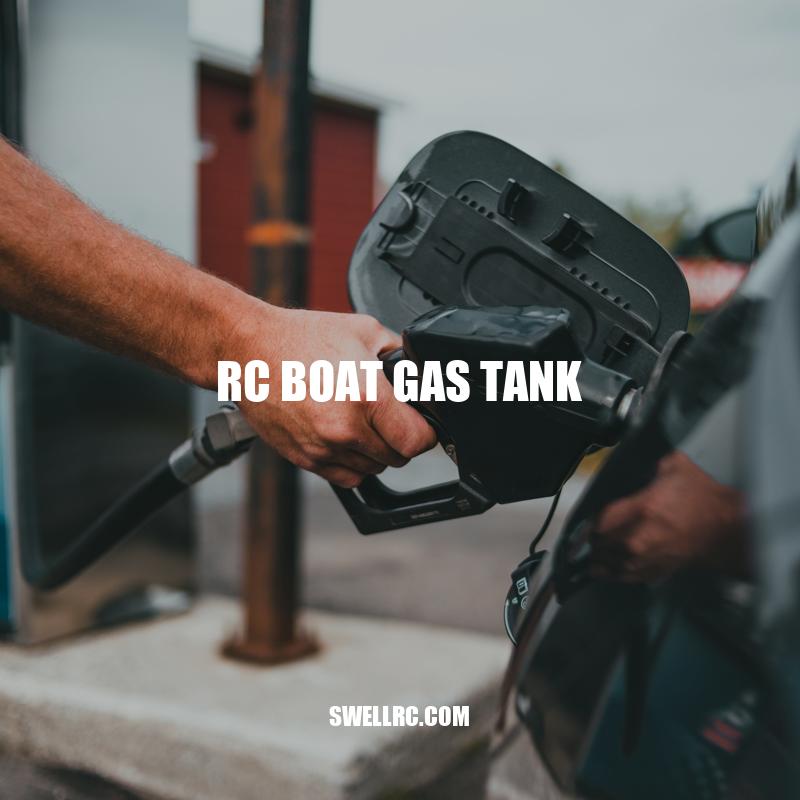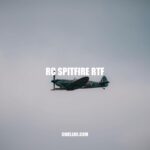Choosing the Right RC Boat Gas Tank: Types, Capacity, Installation, and Maintenance
RC boats are becoming increasingly popular, owing to the excitement and thrill of racing them across water bodies like lakes and rivers. To achieve the much-needed speed and power, RC boats rely on various components, with the gas tank being one of the most crucial. A gas tank, which connects to the engine of an RC boat, provides the fuel needed to power the boat’s motor. The gas tank is, thus, a necessary consideration for anyone who wants to invest in an RC boat since its quality and suitability could significantly impact the boat’s performance. This article covers everything you need to know about the RC boat gas tank to help you choose the best option for your boat.
Types of RC Boat Gas Tanks
- Plastic gas tanks
- Lightweight and easy to install
- Can be affected by UV light and become brittle over time
- Well-suited for nitro-methane fuel
- Metal gas tanks
- Generally more robust and durable than plastic gas tanks
- Heavier and bulkier
- Well-suited for gasoline fuel
- May require additional ventilation and cooling methods
- Composite material gas tanks
- Offer the best of both worlds as they are durable and lightweight
- Expensive compared to plastic and metal gas tanks
- Compatible with both gasoline and nitro-methane fuel
When considering which type of gas tank to choose, it’s essential to weigh the advantages and disadvantages of each. Popular brands like Traxxas and Dubro make a variety of both plastic and metal gas tanks, while composite material gas tanks are less common. Plastic gas tanks tend to be the most affordable option, while metal and composite gas tanks are generally more expensive.
What are the advantages and disadvantages of using composite material gas tanks for RC boats?
Advantages of using composite material gas tanks for RC boats include their light weight and durability. However, they can be expensive and difficult to repair if damaged.
Fuel Capacity and Compatibility
- Gasoline fuel
- More widely available than nitro-methane and methanol
- High performance and suitable for larger RC boats
- More flammable than nitro-methane and methanol
- Nitro-methane fuel
- Higher performance than gasoline fuel
- Requires special handling and equipment due to its corrosive nature
- Emissions from nitro-methane fuel combustion have negative effects on the environment
- Methanol fuel
- Produces less power than gasoline and nitro-methane fuel
- Requires additional maintenance due to its moisture-absorbing properties
- Can be challenging to find in certain areas
When choosing an RC boat gas tank, it’s crucial to consider fuel capacity and compatibility carefully. Factors that affect fuel consumption include the size and weight of the RC boat, the engine’s horsepower, and the operating conditions. Different fuel types may be preferred to match the durability and performance of the RC boat.
It’s interesting to note that some racing organizations enforce fuel limits to maintain fair competition across all participants. Here is a table showcasing the fuel limits in some popular racing organizations:
| Racing Organization | Gasoline Fuel Limit | Nitro-methane Fuel Limit |
|---|---|---|
| International Model Power Boat Association (IMPBA) | 20% | 40% |
| National Model Powerboat Association (NAMBA) | 20% | 40% |
| American Model Yachting Association (AMYA) | 15% | 42% |
It’s always best to stay within the recommended fuel limits for optimal performance and safety of the RC boat.
What are the fuel limits enforced by popular racing organizations for gasoline and nitro-methane fuel in RC boats?
The fuel limits enforced by popular racing organizations for gasoline and nitro-methane fuel in RC boats vary, but typically range from 10%-40% nitro content for nitro-methane and 20%-30% ethanol for gasoline.
Installation and Maintenance
- Installation
- Ensure the gas tank is securely mounted within the RC boat
- Use appropriate screws, nuts, and washers to avoid gas tank detachment during use
- Connect fuel lines firmly to prevent leaks
- Maintenance
- Clean the gas tank regularly to avoid the buildup of sediment or debris
- Inspect fuel lines and connections before and after use
- Replace fuel filters annually or as needed
- Common problems and Troubleshooting
- Leaking fuel tank
- Clogged fuel lines or filters
- Unresponsive fuel pressure or air leaks
It’s essential to install and maintain the RC boat gas tank for optimal performance and safety. Proper installation will prevent gas leaks or vibrations that could damage the engine or the RC boat. Regular maintenance ensures that the gas tank is consistently clean and functional, and any problems are immediately discovered and resolved.
When it comes to troubleshooting, it’s worthwhile to visit forums or websites dedicated to RC enthusiasts. These sites often provide useful tips on how to resolve common RC boat gas tank problems. Additionally, manufacturers have dedicated customer service personnel or help pages that can assist with specific gas tank issues.
What are some common problems that can occur with an RC boat gas tank, and how can they be troubleshooted?
Common problems that can occur with an RC boat gas tank includes fuel leaks, clogged fuel lines, and inadequate fuel flow. To troubleshoot these issues, one can check the fuel lines for any damages or blockages, ensure the fuel tank cap is tightly sealed, and adjust the fuel needle valve for proper flow.
Accessories and Upgrades
- Fuel line filters
- Aluminum fuel line fittings and clamps
- Pressure regulators with gauge
- Fuel line connections
- Gas tank caps
- Fuel tanks with built-in fuel pump and filter
- Gasoline quick-fill caps
- Digital fuel level gauge
- Fuel tubing
RC boat enthusiasts can upgrade their RC boat gas tanks with various accessories and upgrades that can improve their performance and longevity. Here is a list of some popular items and their benefits:
- Fuel Line Filters – To avoid contamination and blockages in the fuel system
- Aluminum Fuel Line Fittings and Clamps – For secure fuel line connections and prevention of gas leaks
- Pressure Regulators with Gauge – To ensure proper adjustment of fuel pressure and prevent engine flooding
- Fuel Line Connections – To prevent fuel leaks and ensure smooth fuel flow between the gas tank and engine
- Gas Tank Caps – To prevent evaporation of fuel and dirt buildup in the gas tank
- Fuel Tanks with Built-in Fuel Pump and Filter – To regulate and filter fuel flow and prevent overheating of the engine
- Gasoline Quick-Fill Caps – To make the refueling process quicker and more manageable
- Digital Fuel Level Gauge – To check the level of fuel in the gas tank accurately
- Fuel Tubing – To have additional fuel lines that can be used for repairs or replacements
These accessories and upgrades can enhance the performance and durability of the RC boat gas tank, ultimately leading to a better overall experience. Many manufacturers offer an array of accessories and upgrades for their gas tanks. It’s recommended to check their website or visit forums dedicated to RC boats to find the best products and fits for your specific RC boat gas tank.
What are some common accessories and upgrades for RC boat gas tanks?
Some common accessories and upgrades for RC boat gas tanks include fuel filters, fuel lines, fuel tanks with higher capacity, and fuel vent/overflow valves.
Conclusion
In conclusion, the RC boat gas tank plays a vital role in powering an RC boat. Choosing the right type of gas tank, ensuring its fuel capacity compatibility, proper installation, and maintenance are key to maximizing performance and extending the life of the gas tank. With the addition of accessories and upgrades, RC enthusiasts can customize their RC gas tanks to achieve optimal results. Many brands manufacture specialized accessories and upgrades for their gas tanks, ensuring compatibility and maximizing efficiency. It’s essential to research the best fit for their RC boats, read reviews, and consult with forums to find the best product to meet their specific needs. In the end, with the right RC boat gas tank, proper maintenance, and upgrades, RC enthusiasts can get the most out of their RC boat experience.



